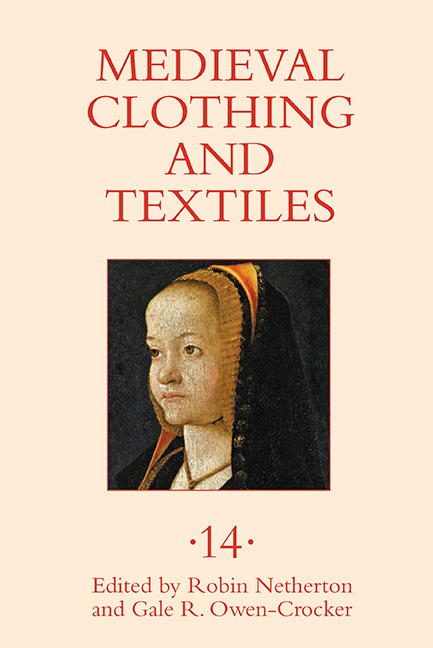Book contents
- Frontmatter
- Contents
- Illustrations page
- Tables
- Contributors
- Preface
- 1 Multicultural Clothing in Sixth-Century Ravenna
- 2 Byzantine and Oriental Silks in Denmark, 800–1200
- 3 The Bliaut: An Examination of the Evidence in French Literary Sources
- 4 Eyebrows, Hairlines, and “Hairs Less in Sight”: Female Depilation in Late Medieval Europe
- 5 Lexical Exchange with Italian in the Textile and Wool Trades in the Thirteenth to Fifteenth Centuries
- 6 Hidden in Plain Black: The Secrets of the French Hood
- Recent Books of Interest
- Contents of Previous Volumes
1 - Multicultural Clothing in Sixth-Century Ravenna
Published online by Cambridge University Press: 13 July 2019
- Frontmatter
- Contents
- Illustrations page
- Tables
- Contributors
- Preface
- 1 Multicultural Clothing in Sixth-Century Ravenna
- 2 Byzantine and Oriental Silks in Denmark, 800–1200
- 3 The Bliaut: An Examination of the Evidence in French Literary Sources
- 4 Eyebrows, Hairlines, and “Hairs Less in Sight”: Female Depilation in Late Medieval Europe
- 5 Lexical Exchange with Italian in the Textile and Wool Trades in the Thirteenth to Fifteenth Centuries
- 6 Hidden in Plain Black: The Secrets of the French Hood
- Recent Books of Interest
- Contents of Previous Volumes
Summary
The collection of the municipal papyri of Ravenna contains nearly a hundred documents and covers the period between 445 and the mid-seventh century. All surviving archival material was incorporated into the municipal records of Ravenna during the Ostrogothic and first Byzantine period (445–ca. 600) and then into the chancery of the Ravenna Archdiocese of the Exarchate (642/3–665/6). The critical edition of fifty-nine of those papyri was published by Jan Olof Tjäder beginning in 1954. These are all private documents, such as settlements of inheritances, donations, leases, sales, and wills.
In the cases of inheritance settlements, testamentary executors surrendered legacies of land, property, and movable objects to beneficiaries of post-obitum bequests or donation charters sanctioned in front of the municipal curia, the city's judicial institution. The transactions were authenticated and incorporated into the public record for taxation purposes in the form of the Gesta Municipalia (city document register). While these inheritance settlements are, strictly speaking, donation charters, many of them refer to the proving of the will and to its ceremonial character, which are traits common to Late Roman legal practice produced within the multicultural, multilingual trade centre of sixth-century Ravenna.
All the extant documents testify to a continuation of Roman legal practice of the municipal curia, involving the publication formulae and the probate procedure. Very few Italian or other towns around the Mediterranean or north of the Alps offer such solid evidence of post-Classical socio-juridical continuity during the turbulent sixth century.
During my research for a book-length comparative study on early medieval dress and accessories among large regions of early medieval Europe, I became aware of the diverse lexicological evidence for garments and accessories found in the accounts of testamentary provisions in the Gesta Municipalia of Ravenna. The terms relating to these items came with a specification of their exact monetary value, which can be put together with the semantic and etymological study of the vocabulary.
In this article the focus will be on the non-gender-specific dress of mid-sixth-century Ravenna, a multiethnic city containing Latins, Greeks, Ostrogoths, and perhaps a few Franks, Avars, and Langobards of various religious faiths and denominations. A lexicographical enquiry into the clothing of this period is possible thanks to the special historical and geographical conditions of Ravenna and its continuous intraregional and maritime trading relationships over and beyond the Po plain, the Byzantine south, and Rome.
- Type
- Chapter
- Information
- Medieval Clothing and TextilesVolume 14, pp. 1 - 36Publisher: Boydell & BrewerPrint publication year: 2018

